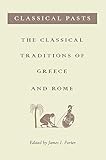Classical Pasts : The Classical Traditions of Greece and Rome / ed. by James I. Porter.
Material type: TextPublisher: Princeton, NJ : Princeton University Press, [2021]Copyright date: ©2006Description: 1 online resource (465 p.) : 39 halftones. 2 line illus. 1 tableContent type:
TextPublisher: Princeton, NJ : Princeton University Press, [2021]Copyright date: ©2006Description: 1 online resource (465 p.) : 39 halftones. 2 line illus. 1 tableContent type: - 9780691225395
- Civilization, Greco-Roman
- HISTORY / Ancient / General
- Academy
- Achaemenids
- Acusilaus of Argos
- Alcamenes
- Antinoopolis
- Athenocentrism
- Bacchylides
- Boeotia
- Bronze Age
- Caecilius
- Callimachus
- Cato
- Corinthian classicism
- Dionysius
- Domitian
- Empedocles
- Ennius
- Epicureanism
- Gorgias
- Hadrian
- Hellenism
- Hera Teleia
- Horace
- Italic art
- Jesus
- Jupiter Dolichenus
- Justinian
- Laevius
- Latin
- Livius Andronicus
- Lucian
- Lycurgus
- Lysias
- Maecenas
- Martial
- Oppian
- Osiris
- classicus
- cultural memory
- democracy
- emotion
- euphonism
- historical distance
- historical narrative
- humanism
- ideology
- imperialism
- modernity
- monuments
- mythography
- naturalism
- neoteric literature
- orality
- oratory
- 938 22
- DE71
- DE71 .C495 2006eb
- online - DeGruyter
| Item type | Current library | Call number | URL | Status | Notes | Barcode | |
|---|---|---|---|---|---|---|---|
 eBook
eBook
|
Biblioteca "Angelicum" Pont. Univ. S.Tommaso d'Aquino Nuvola online | online - DeGruyter (Browse shelf(Opens below)) | Online access | Not for loan (Accesso limitato) | Accesso per gli utenti autorizzati / Access for authorized users | (dgr)9780691225395 |
Frontmatter -- Contents -- List of Illustrations and Table -- Acknowledgments -- List of Abbreviations -- Introduction. What Is “Classical” about Classical Antiquity? -- Part I. The Deep Past: Bronze Age Classicism -- Chapter 1. “No Greater Marvel”: A Bronze Age Classic at Orchomenos -- Part II. Classical Innovations -- Chapter 2. Intimations of the Classical in Early Greek Mousike -- Chapter 3. Rehistoricizing Classicism: Isocrates and the Politics of Metaphor in Fourth-Century Athens -- Part III. Baroque Classics -- Chapter 4. Baroque Classics: The Tragic Muse and the Exemplum -- Part IV. Latin Letters -- Chapter 5. From ΦΙΛΟΣΟΦΙΑ into PHILOSOPHIA: Classicism and Ciceronianism -- Chapter 6. The Concept of the Classical and the Canons of Model Authors in Roman Literature -- Part V. Roman Art -- Chapter 7. Greek Styles and Greek Art in Augustan Rome: Issues of the Present versus Records of the Past -- Chapter 8. Classicism in Roman Art -- Part VI. Imperial Prose -- Chapter 9. Feeling Classical: Classicism and Ancient Literary Criticism -- Chapter 10. Quickening the Classics: The Politics of Prose in Roman Greece -- Coda. Looking Back and Beyond -- Chapter 11. Athens as the School of Greece -- Bibliography -- Contributors -- Index
restricted access online access with authorization star
http://purl.org/coar/access_right/c_16ec
The term "classical" is used to describe everything from the poems of Homer to entire periods of Greek and Roman antiquity. But just how did the concept evolve? This collection of essays by leading classics scholars from the United States and Europe challenges the limits of the current understanding of the term. The book seeks not to arrive at a final definition, but rather to provide a cultural history of the concept by exploring how the meanings of "classical" have been created, recreated, and rejected over time. The book asks questions that have been nearly absent from the scholarly literature. Does "classical" refer to a specific period of history or to the artistic products of that time? How has its definition changed? Did those who lived in classical times have some understanding of what the term "classical" has meant? How coherent, consistent, or even justified is the term? The book's introduction provides a generous theoretical and historical overview. It is followed by eleven chapters in which the contributors argue for the existence not of a single classical past, but of multiple, competing classical pasts. The essays address a broad range of topics--Homer and early Greek poetry and music, Isocrate, Hellenistic and Roman art, Cicero and Greek philosophy, the history of Latin literature, imperial Greek literature, and more. The most up-to-date and challenging treatment of the topic available, this collection will be of lasting interest to students and scholars of ancient and modern literature, art, and cultural history.
Mode of access: Internet via World Wide Web.
In English.
Description based on online resource; title from PDF title page (publisher's Web site, viewed 07. Nov 2022)


